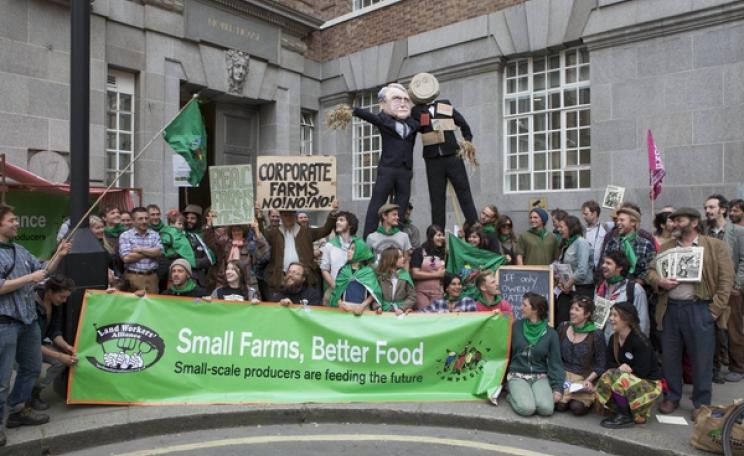You may be forgiven for assuming there’s nothing too exciting about set-aside land. In fact, even among Britain’s farming community the term tends to hold the same conversational currency as that of ‘cross-compliance measures’ and ‘decoupling’. It comes as a welcome surprise then that a recent EU decision to reduce the area of required set-aside land to zero for the first time in its 20 year history seems to have cut through the colloquial manure and highlighted what’s going wrong down on the farm.
When announcing the effective removal of the provision that requires farmers deliberately to take land out of production, EC commissioner Mariann Fischer Boel kindly reminded farmers that: ‘A zero per cent setaside rate for 2008 still allows farmers to leave land uncropped or to participate in environmental schemes’. I’m sure they would if they could, Madame Boel, but considering the price of wheat has risen from £120 to £250 a tonne in the past 12 months I think it’s safe to predict a bumper cereal harvest.
Understandably, environmental groups such as the RSPB and Natural England are immediately concerned with the habitat loss. According to a survey conducted by the Department for Environment and Rural Affairs in response to the announcement, it is estimated that the area of farmland under setaside will effectively half from 395,500 ha in 2007 to less than 200,000 ha this year.
Apart from environmental concerns, this recent development raises important questions about the sanity of an agricultural policy increasingly dislocated from the countryside. The reasoning behind the EU decision is not a sudden concern over the Commission’s interventionist policies in agriculture, but instead an economic incentive to increase wheat production and offset soaring food prices. And this, in essence, is the problem.
Set-aside, unlike the bureaucratic language that surrounds it, isn’t actually a new concept. ‘Fallow’ periods were traditionally used by farmers to maintain the natural productivity of their land. The benefits of leaving land fallow for extended periods include rebalancing soil nutrients, re-establishing soil biota, breaking crop pest and disease cycles, and providing a haven for wildlife.
Like many rural skills, the technique evolved along with a sustainable model of settled agriculture that supported the UK’s population for well over 3,000 years. Up until 1939 it was estimated that 800,000 ha of British countryside was voluntarily placed under fixed or rotational fallows at any time. The idea seems bizarre now, that less than a generation ago British farmers would have had the freedom, let alone the financial security, to improve their land in this way.
The fact is farmers are no longer trusted to use their own judgement in managing the British countryside. If they were, set-aside areas would still be managed as the most effective means of building soil fertility. Inevitably, however, fallow farming has been deemed ‘uneconomic’ by the same logic that has seen agricultural imports and exports increase by 74 and 55 per cent respectively since 1962.
It is nearly half a century since the inception of the Common Agricultural Policy (CAP) and the coincidental death of traditional farming in the UK. The past 50 years have seen the majority of British farmers increasingly frustrated, initially through incentives to industrialise domestic production and restrictions to curb surpluses, and more recently through plummeting prices resulting from trade liberalisation.
Later this year, the CAP is booked in for a widely publicised ‘Health Check’, the policy’s fourth major review since 2000. One farmer I spoke to recently placed it neatly in context for me: ‘Health check?’ he said. ‘They need a reality check – and while they’re at it they can send through my overdue farm payment cheque as well!’ This view is representative of the reputation the CAP has in the countryside today: on the one hand woefully incompetent; on the other essential for survival.
Agriculture in the UK is currently in a state of flux; never before has food and farming been under such public and political scrutiny. Rising oil prices and ‘peak oil’ are set fundamentally to reshape the face of an industry that has seen oil dependence spread from mechanisation through to agrochemical production and global supply chains.
The need for relocalisation has never been stronger. In February this year, the UK’s Office for National Statistics announced that staple food prices are expected to rise exponentially over the next 12 months in direct correlation with the price of oil. The scale of habitat destruction predicted by the RSPB across the UK this spring is only the latest casualty of a policy that has consistently chosen to ignore the consequences of unrestricted growth.
Now is the time for action in preparing for UK food security in a post fossil-fuel age; now is the time when our farmers should be handed the autonomy to use their own initiative and produce local food for local markets. Now is not the time for legislation prompted by economic forecasts oblivious to a gathering storm. It is time, I would suggest – Madame Boel – to leave the cow shit in the countryside and the bullshit in Brussels.
Ed Hamer is a freelance journalist specialising in agricultural globalisation issues. He also works on a small family farm in Devonshire
This article first appeared in the Ecologist June 2008







